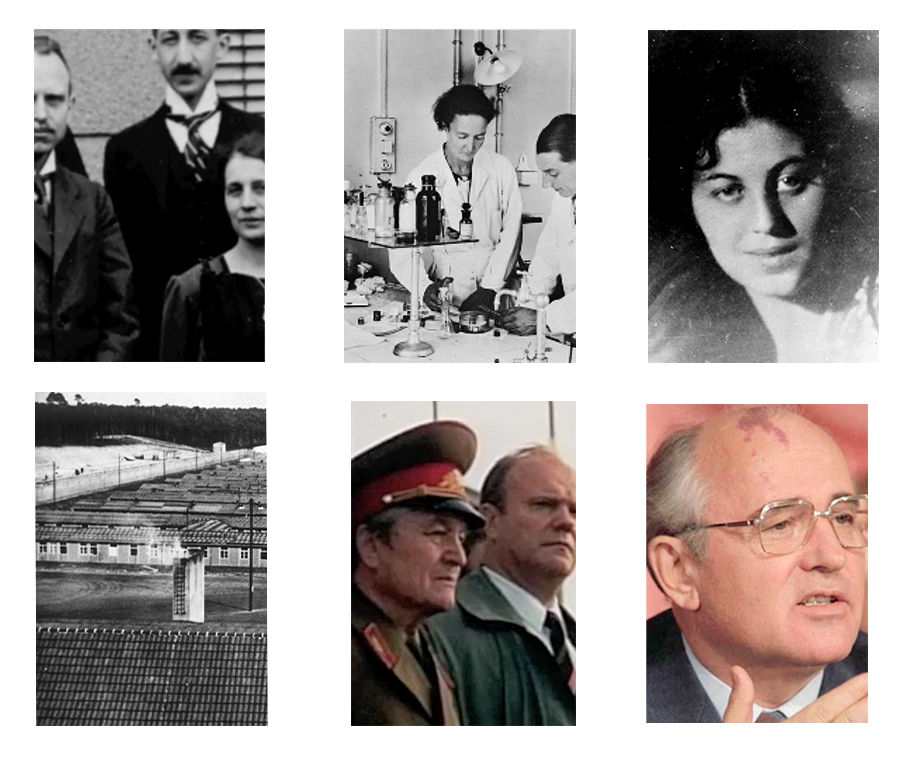$50.00
Description
Unlike previous offerings, the following product does not consist of physical DVDs. You are paying for the rights to view all six films privately hosted on Vimeo. Upon purchase, you will receive six private URLs (one for each film) as well as the password to view them.
See Licensing Agreement Terms for more information.
To view the trailer and expanded cast & crew information, visit the each film’s dedicated page in the Completed Film’s section or via the link in each film title below.
Film One
The Path To Nuclear Fission: The Story of Lise Meitner and Otto Hahn

This film tells the story of Lise Meitner, a leading atomic scientist in Germany at the onset of the atomic era. As a Jew, she faced major upheavals in her life and career due to the rise of the Nazis, but this did not prevent her from making one of the most significant contributions to modern science, the discovery of nuclear fission. She was forced to flee Nazi Germany, but continued her work by secretly remaining in contact with her colleagues there. However, when this work was awarded a Nobel Prize, she was not acknowledged. This film features Academy Award Winner Linda Hunt as narrator.
This film can serve to broaden the perspective and knowledge of all learners, and it is also ideal to encourage female students to study Science, Technology, Engineering and Math (“STEM”) curriculum.
Film Two
Out from the Shadows: The Story of Irene Joliot Curie and Frederic Joliot Curie

This film tells the story of Lise Meitner, a leading atomic scientist in Germany at the onset of the atomic era. As a Jew, she faced major upheavals in her life and career due to the rise of the Nazis, but this did not prevent her from making one of the most significant contributions to modern science, the discovery of nuclear fission. She was forced to flee Nazi Germany, but continued her work by secretly remaining in contact with her colleagues there. However, when this work was awarded a Nobel Prize, she was not acknowledged. This film features Academy Award Winner Linda Hunt as narrator.
This film can serve to broaden the perspective and knowledge of all learners, and it is also ideal to encourage female students to study Science, Technology, Engineering and Math (“STEM”) curriculum.
Film Three
Where Birds Never Sang: The Ravensbrueck and Sachsenhausen Concentration Camps

These were two major camps located within Germany, outside of Berlin. Both were built as labor camps, but eventually they both became death camps when gas chambers were built on the grounds. Ravensbrueck became a training center for the 2,400 women guards who were deployed throughout the camp system, including Auschwitz. It was also used as a brothel to welcome particular soldiers and male inmates from Sachsenhausen. Many famous women were housed at Ravensbrueck, including Gemma LaGuardia, sister of Fiorello LaGuardia, mayor of NYC while Gemma was a prisoner and Margarete Buber, the daughter-in-law of the Jewish philosopher, Martin Buber.
The films can be used for gender studies classes, Jewish studies classes, World War ll studies and in studies on human rights.
Film Four
Widow of the Revolution: The Anna Larina Story

Widow of the Revolution: The Anna Larina Story tells the story of the young bride of Nikolai Bukharin, one of the top leaders in the early years of the Russian Revolution. This documentary is based on her memorable autobiography, “This I Cannot Forget,” which she wrote late in life, after being imprisoned by Stalin for almost twenty years in the Russian Gulag.
Widow of the Revolution: The Anna Larina Story can be used effectively in gender studies classes, as well as in Russian history classes.
Film Five
Russia Betrayed? Voices of the Opposition

Filmed during the last few months prior to the 1996 Russian presidential election, when four opposition candidates to Boris Yeltsin were running for president of Russia. Most Americans were unaware of these opposition leaders. Russian scholar Stephen F. Cohen interviews the oppositionists: Aleksandr Lebed, Gennady Zyuganov, Grigory Yavlinsky and Aleksandr Rutskoi.
Film Six
Conversations with Gorbachev

This 1994 documentary, Conversations with Gorbachev, by Rosemarie Reed helps shed light on world events, from the first-hand perspective of former Soviet President Mikhail Gorbachev, interviewed by Professor of Russian and Soviet Studies at New York University and Princeton, Dr. Stephen F. Cohen.
Filmed over one week in Gorbachev’s office in Moscow, the former leader of the Soviet Union is open, spry and emphatic on his time in office and the future of Russian and United States relations.
Conversations with Gorbachev can be used in political science classes and Russian studies, Eastern European Studies and American studies. Consider adding the film to your collection.


Leave a Reply